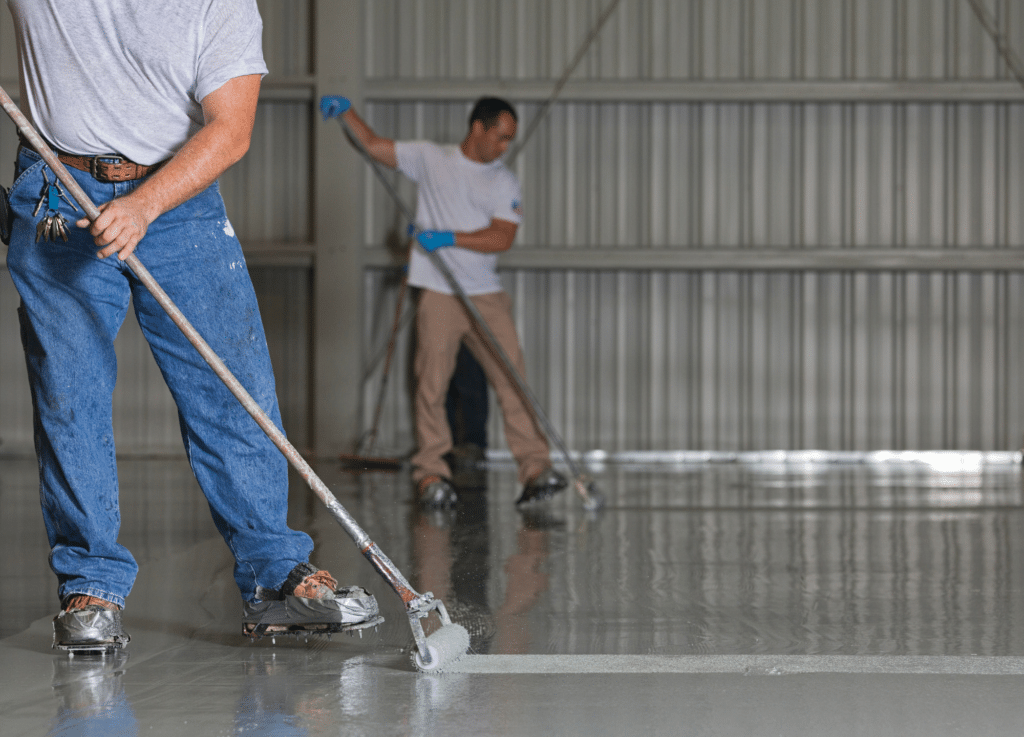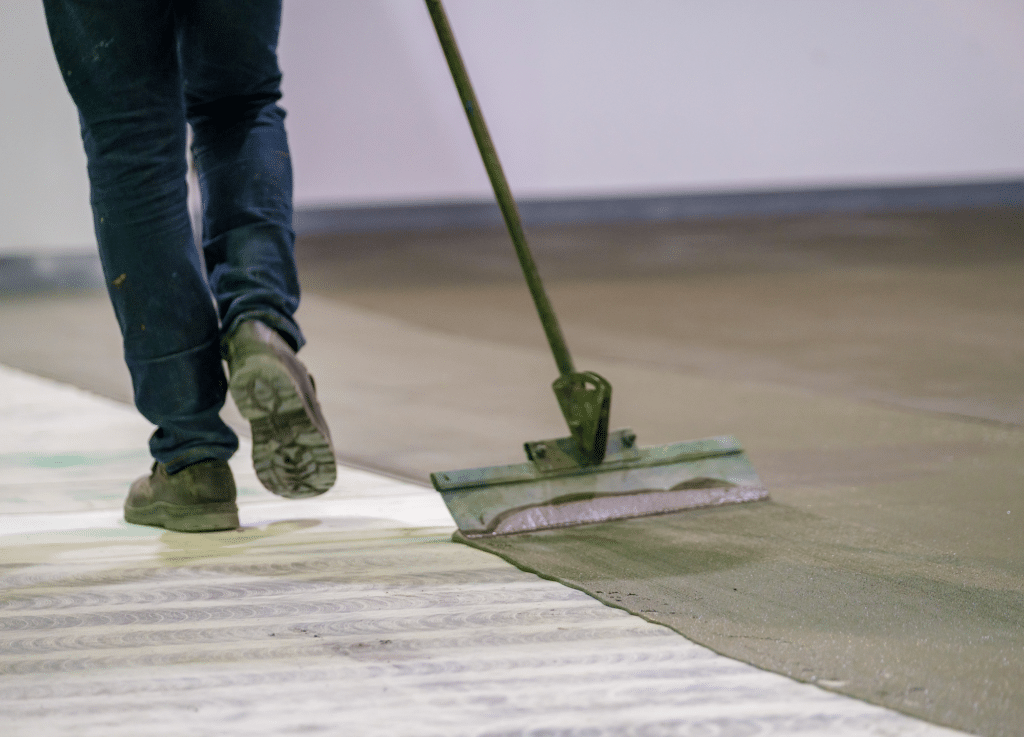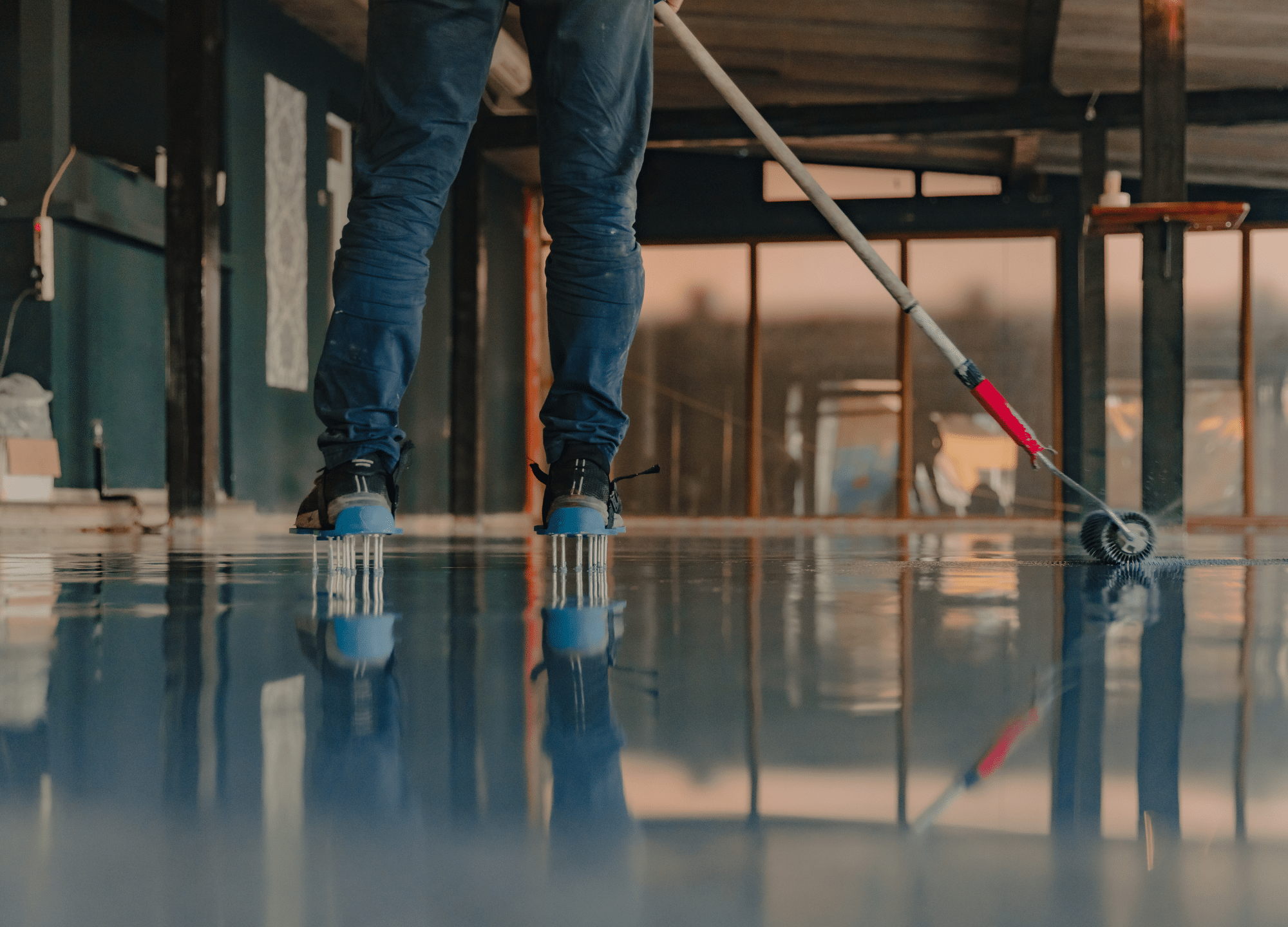DJ Corporate Solutions: Epoxy Flooring, Epoxy Countertops, and Interior & Exterior Painting Services
Flooring is the often-underappreciated workhorse of a commercial or industrial space, subjected to the wear and tear of forklifts, heavy machinery, and foot traffic. When durability, safety, and cleanliness are non-negotiable, epoxy floor coatings have proven to be a dependable solution for facility managers and industry professionals alike. In this comprehensive guide, we will explore the numerous benefits of epoxy coatings, their applications across different industries, and essential factors to consider when choosing and maintaining your epoxy floors.
Epoxy floor coating is specifically designed to cater to the rigorous demands of industrial environments, where concrete floors are prevalent. Unlike traditional flooring options, industrial epoxy floor coating provides a robust and resilient layer that adheres securely to concrete surfaces, effectively transforming them into areas capable of withstanding high levels of stress from industrial operations. Furthermore, the versatility and durability of industrial floor epoxy make it an ideal choice for a wide range of applications, from manufacturing facilities and warehouses to chemical plants and garages. Its ability to resist stains, impacts, and chemicals ensures that floors not only remain functional under extreme conditions but also maintain an aesthetic appeal over time.
Benefits of Epoxy Floor Coatings

Durability Beyond Measure
Epoxy floor coatings are renowned for their robust nature, providing a resilient surface that withstands the daily onslaught of industrial life. From impact resistance to the ability to carry heavy loads, epoxy’s toughness is unmatched, offering longevity that can outlast most traditional flooring options by several years.
Chemical Resistance at Its Core
One of the key selling points of epoxy coatings is their capacity to resist chemical spills and damage from acids, solvents, and other harsh substances. This feature is invaluable in settings where spills are common, such as manufacturing plants and laboratories, thus maintaining a safe and hygienic environment for workers.
Simplifying the Maintenance Equation
Epoxy floors are exceptionally easy to clean and maintain. Unlike porous surfaces, the smooth, seamless finish of epoxy prevents the accumulation of dirt, debris, and bacteria, making it straightforward to keep your floors in top condition with basic cleaning methods.
Aesthetic Appeal and Reflective Shine
Epoxy coatings can transform a drab, dusty environment into a bright, professional-looking space. With options for high-gloss and decorative finishes, epoxy doesn’t just protect – it enhances – leaving a reflective surface that can significantly improve lighting and overall aesthetics.
Applications in Different Industries
From the freezers of industrial kitchens to the bustling corridors of hospitals, epoxy floors are making their mark. The versatility of epoxy lies in its ability to adapt and excel in various settings, ensuring that each industry reaps the benefits uniquely.
Warehousing Wonders
In vast storage facilities, epoxy floors provide the perfect solution to combat heavy foot and equipment traffic. Their durability and high resistance to vehicular traffic make them indispensable in maintaining a smooth, damage-free surface over time.
Manufacturing Mastery
Manufacturing plants, often home to corrosive substances and high-impact activities, require the sturdiest of floors. Epoxy’s chemical and impact resistance make it a go-to for both safety and practicality, allowing for the smooth operation of plant machinery without concern for floor damage.
Hospital Hygiene Heroes
Hospitals and healthcare facilities demand the highest hygiene standards. Epoxy floors, with their seamless and non-porous characteristics, prevent the growth of bacteria and mold, ensuring a sterile environment that is easily sterilized and maintained – vital aspects of Infection control.
Retail Renovators
Epoxy is giving retail spaces a polished transformation, providing an elegant and inviting environment for customers. With customizable colors and designs, businesses can create a unique aesthetic that complements their brand, while the ease of maintenance promises a long-lasting, attractive storefront.
Choosing the Right Epoxy Coating
Not all epoxy coatings are created equal, and making the right choice for your specific requirements is paramount. A variety of factors should influence your decision, from the type of industry to the floor’s anticipated use and the desired look.
Factors to Consider
Before selecting an epoxy coating, consider the temperature range, exposure to UV light, and any specific regulatory guidelines that apply to your industry. Assess your floor’s existing condition, any repairs that may be needed, and the expected operational environment. The more thoroughly you evaluate these aspects, the better the epoxy system you can specify.
Types of Epoxy Coatings
From water-based to solvent-based, and from self-leveling to mortar floor systems, there are multiple epoxy options, each tailored to differing substrates and uses. Water-based epoxies offer low VOC and a fast cure time, making them environmentally friendly and suitable for spaces that require a quick turnaround. On the other hand, solvent-based epoxies offer greater durability and are ideal for heavy industrial environments.
Installation Process
Preparation is Key
The success of an epoxy flooring project hinges on thorough surface preparation. This includes cleaning the substrate, repairing any damages, and ensuring the environment is suitable for proper adhesion. Professionals often use mechanical methods like shot blasting or diamond grinding to achieve an ideal surface for epoxy application.
Application for Lasting Finish
With the surface prepped, the epoxy is mixed, applied, and spread carefully. Timing is crucial, as each layer needs to cure before the next is added. The method of application, whether rolling, troweling, or spreading, depends on the specific epoxy system selected and the desired finish.
Curing and Ongoing Maintenance
The curing process can take up to a week, depending on environmental factors like temperature and humidity. Once cured, epoxy floors require minimal maintenance but benefit from regular cleaning to retain their sheen and anti-slip properties. Spot repairs may be necessary over time, especially in high-traffic areas, and can easily be executed by a professional.
Case Studies or Testimonials
Industries Thriving with Epoxy
Highlight specific industries that have seen significant improvement after implementing epoxy floor systems. Testimonials from facility managers could illustrate firsthand how epoxy coatings have enhanced their workspaces, saving time, money, and headaches with their reliable performance.
Before and After Success Stories
Photographs of real-world transformations can be particularly striking, demonstrating the contrast between old, worn floors and the revitalized look and feel of epoxy-treated surfaces. Describe the challenges each industry faced prior to the installation of epoxy floors and the visible improvements post-installation.
Epoxy floor coatings have cemented their place as an indispensable component of modern industrial and commercial spaces. The remarkable durability, safety features, easy maintenance, and aesthetic enhancements they offer contribute to a more productive and inviting work environment.
When contemplating a flooring solution, it’s important to engage with a reputable epoxy flooring professional who can guide you through the selection, installation, and ongoing maintenance processes. With careful consideration and proper care, epoxy floors can offer a high return on investment and a flooring solution that you can rely on for years to come.
For those who have yet to explore the benefits of epoxy flooring, now is the time to make the change. Contact an epoxy floor specialist and experience firsthand how this simple upgrade can make a monumental difference in your commercial or industrial space.

Frequently Asked Questions (FAQs)
What is Epoxy Floor Coating?
Epoxy floor coating is a type of floor covering that consists of a primer, a base coat, and a topcoat. It’s a durable and resilient solution made from a mixture of resin and hardener, which, when combined, chemically react to form a tough, rigid plastic material that bonds well to most base layers, making it ideal for a wide range of applications.
Why Choose Epoxy Coating for Garage Floors?
Epoxy coatings provide a durable, waterproof, and chemical-resistant surface, making them an excellent choice for garage floors that need to withstand heavy traffic, harsh chemicals from auto repair activities, and frequent wear and tear. Additionally, epoxy offers a high gloss finish that is not only aesthetically pleasing but also makes it easy to clean and maintain.
How Does Epoxy Compare to Other Floor Coatings in Terms of Chemical Resistance and Durability?
Epoxy floor coatings are specially formulated to offer superior adhesion, abrasion resistance, and chemical resistance compared to other floor coatings. This makes them an ideal choice for industrial applications, auto repair shops, and areas exposed to harsh chemicals.
Can Epoxy Flooring Be Decorative?
Yes, epoxy flooring can be highly decorative. Color flakes, different color options, and the ability to achieve a high gloss finish allow for the creation of stunning, visually appealing floors. Special techniques can even mimic the appearance of marble, granite, or other high-end materials.
Is Epoxy Flooring Cost-Effective?
Epoxy flooring is considered cost-effective due to its long lifespan, low maintenance requirements, and the protection it offers to the underlying concrete from moisture, stains, and cracks. Its durability means it doesn’t need to be replaced as often as other flooring options, saving money over time.
What Are Some Key Considerations for Installing Epoxy Flooring in Garages?
Key considerations include ensuring the concrete is clean, free of cracks, and properly primed. The garage should be free from moisture issues, and the environment should allow for the proper curing of the epoxy. Preparation is critical to achieving professional results and ensuring the coating bonds well to the concrete.
Are There Different Types of Epoxy Coatings?
Yes, there are multiple types of epoxy coatings, including water-based epoxy, solvent-based epoxy, and 100% solids epoxy. Each type has its specific use cases, with water-based epoxies being more environmentally friendly and suitable for light applications, while 100% solids epoxy offers the greatest durability for heavy industrial use.
How Do I Maintain My Epoxy Floor Coating?
Maintaining an epoxy floor coating involves regular cleaning to remove dirt and debris, using soft cleaning tools to avoid scratches, and avoiding harsh chemicals that might damage the coating. It’s also important to address any chips or cracks promptly to maintain the integrity of the flooring.
Can Epoxy Flooring Be Applied to Any Surface?
Epoxy flooring can be applied to many surfaces but works best on concrete that’s clean, dry, and free of major cracks or damage. The surface must be properly prepared through grinding or shot blasting to ensure the epoxy coating can achieve a secure bond.
What Is the Typical Working Time for an Epoxy Coating Installation?
The working time for an epoxy coating installation can vary depending on the type of epoxy used, the application method, and the environmental conditions. Generally, most projects require at least a couple of days to complete, including preparation, application, and curing time, with some taking longer for more complex finishes or large areas.

